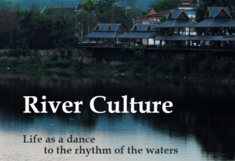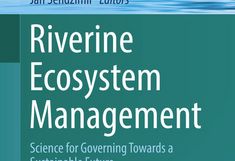Downloads
Book: River Culture – Life as a dance to the rhythm of the waters
Back to life in the rhythm of the waters
The global crises of biodiversity and cultural diversity are interdependent, especially so in rivers. While we know that 84% of the freshwater fauna has disappeared between 1970 and 2014, the loss in cultural diversity connected to the river and its floodplain (e.g., spiritual linkages, traditional use forms, adapted architecture, etc.) is as yet unknown.
This book makes a first attempt to deal with biological and cultural diversities altogether, depicting the bio-cul-tural diversities, historical human-river relation-ships, threats, and practical examples of how to mitigate the crisis in riverscapes. More than 120 authors present interdisciplinary studies from river systems all over the world, and explore overarching issues on river ma-nagement in the Anthropocene.
Modern societies increasingly re-integrate the river into their lifestyle, driven by citi-zens' movements and/or by governments.
Practitioners and scientists in landscape and urban planning, ecologists, sociologists, NGOs and governments are invited to disseminate the positive examples presented here, to document their own work, and to contribute to a more harmonious and peaceful life in riverscapes.
Link to the book:
https://unesdoc.unesco.org/ark:/48223/pf0000382775
"Riverine Ecosystem Management - Science for Governing Towards a Sustainable Future"
This open access book surveys the frontier of scientific river research and provides examples to guide management towards a sustainable future of riverine ecosystems.
Principal structures and functions of the biogeosphere of rivers are explained; key threats are identified, and effective solutions for restoration and mitigation are provided.
Rivers are among the most threatened ecosystems of the world. They increasingly suffer from pollution, water abstraction, river channelisation and damming. Fundamental knowledge of ecosystem structure and function is necessary to understand how human acitivities interfere with natural processes and which interventions are feasible to rectify this.
Modern water legislation strives for sustainable water resource management and protection of important habitats and species. However, decision makers would benefit from more profound understanding of ecosystem degradation processes and of innovative methodologies and tools for efficient mitigation and restoration. The book provides best-practice examples of sustainable river management from on-site studies, European-wide analyses and case studies from other parts of the world. This book will be of interest to researchers in the field of aquatic ecology, river system functioning, conservation and restoration, to postgraduate students, to institutions involved in water management, and to water related industries.
Free download (PDF/EPUB):
https://rd.springer.com/book/10.1007/978-3-319-73250-3
Physical copy: https://www.springer.com/in/book/9783319732497


